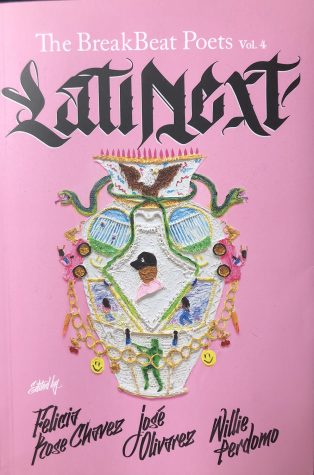Politics and religion: Student poems published in anthology series
May 29, 2020

Most of Victoria Chávez Peralta’s professors encouraged them to share their poetry with the world. Peralta had published work before, but this time was different. This time, it was for the Latinx culture.
“I asked [one of my professors] to look over some poems,” Peralta, a junior creative writing major, said. “He always thought I was ready to be published. In almost every session or class we had, he would put me on blast and say, ‘You need to publish this.’”
Recently, Peralta had two pieces published in “The BreakBeat Poets Vol. 4: LatiNext.”
The anthology includes poems written by “poets who speak from an array of nationalities, genders, sexualities, races, and poetic traditions staking a claim to [their] cultural and civic space.”
Peralta’s mentor and co-editor of the book, José Olivarez, said it is rare to accurately depict Latinidad in pop culture because there are many stereotypes used. Latinidad is not a monolithic culture, Olivarez said.
Latinidad is a term which refers to attributes shared by Latin American people and their descendants without reducing similarities to any essential traits. The term is sometimes used to create a sense of solidarity.
“There may be some similarities from one Latinx experience to the next, but not necessarily,” Olivarez said in a May 18 email to the Chronicle. “It’s important to share narratives of Latinidad for young people to understand their particular experience of Latinidad is valid.”
Poetry—specifically BreakBeat—has been a part of Peralta’s life since they were a child, they said.
“BreakBeat poetry is written in the tradition of hip-hop,” Olivarez said. “BreakBeat poetry is important because it is poetry written in conversation with the world … [and] what it means to be alive right now.”
When Peralta was around 13 years old, they were a part of Louder Than a Bomb, a Chicago youth poetry slam that happens every spring. This experience led to more opportunities for them.
By the time they finished high school, Peralta had a paid internship with the Chicago Author’s Bomb Squad and met Olivarez, who later became their mentor, and he asked Peralta to submit poems for a BreakBeat poetry book.
Peralta’s poems “When Collin Chanted Build the Wall” and “Dios te salve, Maria” were inspired by their personal experiences.
Pegeen Reichert Powell, chair of the English and Creative Writing Department, said students are encouraged to get their work published.
“The ultimate goal for all writers would be to see their work in print,” Reichert Powell said. “I was very impressed and certainly glad to see it in publication.”
“When Collin Chanted Build the Wall” is based on the time surrounding President Donald Trump’s election and how Peralta felt hearing primarily white students echoing xenophobic phrases.
“White people and rich people of color would chant together and look at me and say, ‘build the wall, build the wall,’” Peralta said. “And teachers would not stand up for me. Oftentimes, I had to leave the room.”
As a child of immigrant parents, Peralta was “born and raised around the Berwyn area, just outside of Chicago, and it has a majority Latinx population. And then we were kicked out in the first wave of gentrification in Berwyn,” they said.
“It is hard to carry,” they said. “When your parents are immigrants and they share their stories with you and share their pain, you have generational trauma.”
Peralta said their second poem, “Dios te salve, Maria,” asks the reincarnated Virgin Mary why they are gay when the Latinx culture can be homophobic.
Moving forward, Peralta hopes their poems will inspire more people or at least help them understand what they are feeling.
“It has been strange how many people really identify with it,” Peralta said. “I want people to be read my poetry and think, ‘Wow, I know that feeling.’”







